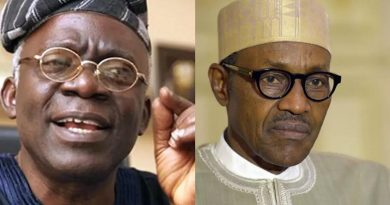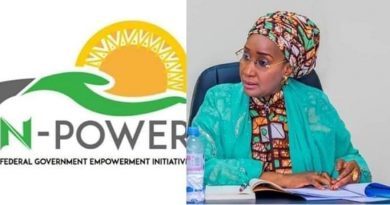Treat terrorists, bandits, sponsors as enemies of state- stakeholders urge FG

By Maureen Atuonwu
Some stakeholders in the South East have called on the Federal and state governments to treat terrorists and their sponsors as enemies of the state and stop granting them pardon.
The stakeholders made the call while responding to a News Agency of Nigeria (NAN) survey on consequences of granting pardon to terrorists and bandits as well as not exposing their sponsors.
They opined that activities of terrorists and bandits had caused a lot of Nigerians to lose their loved ones and property.
In Anambra, a Human Rights activist, Mr Vincent Ezekwueme said that government should stop pardoning terrorists and bandits as they had caused lots of nightmare, killed innocent Nigerians and wasted property worth billions of Naira.
“Government should make them and their sponsors to face the full wrath of the law. They are not supposed to be pardoned considering the enormous havoc they have caused the society.
“People have lost their lives, maimed and some have developed high Blood Pressure due to their nefarious activities. I do not support the idea of granting them pardon.
“You grant them pardon while their leaders and their sponsors are not ready to surrender to government. If you pardon them, how are you sure that when they are joining the larger society they will be responsible citizens?
“They have killed and unleashed havoc on the citizens, so the consequences of the law must take its cause upon them,’’ he said.
Reacting to the Federal Government’s position on not publishing names of those sponsoring terrorism and banditry, Ezekwueme, urged the government to carefully investigate their sponsors and make them face the law.
On his part, a Legal Practitioner, Mr Tagbo Anieto, questioned the Federal Government’s idea of granting pardon to terrorists and bandits, saying that the government should subject them to psychological test to determine if they had repented as claimed.
“There is nothing like repentant when dealing with terrorism and banditry; government is only using that word to make the masses believe that they are working.
“If somebody is repentant, he or she will be made to undergo a psychological test for at least two years, merely using the word pardon or repentant is not enough to truly know if they are fit to live among the citizens,’’ he said.
Some Stakeholders in Ebonyi also decried the pardon given to bandits and terrorists across states of the federation, describing such act as “encouragement of citizens into criminality.”
They also expressed dissatisfaction on how sponsors of terrorism were not being exposed.
Mr John Oko, a lawyer, said that pardoning bandits had done more harm than good in terms of national security.
Oko pointed out that the root of the nation’s security could be traced to the nature of corruption among citizens. No nation can be properly secured in a very corrupt environment.
The legal practitioner stressed the need to overhaul the security outfits of the country, urging the federal and state governments to fish out sponsors of bandits than covering them.
“Pardoning means encouraging persons into criminality. Insecurity is on the increase because we have been treading softly over it.
“Why should a bandit be given pardon and sponsors not exposed? It is wrong.
“Terrorism have become a huge threat to national development. Let me tell you, because of this pardon and ransom payment, many young Nigerians have started to take banditry as lucrative and attractive industry.
“National security need not to be compromised by negotiation and ransom payment. Criminals should be punished according to the law of the land.
“Me, as a lawyer, we are facing serious threat on daily basis from individuals and politicians over matters that involve their errand boys,” Oko stated.
Mrs Grace Nwankwo, a teacher, told NAN that pardoning terrorists could throw the country into anarchy.
“It also encourages more crimes, especially kidnapping and banditry. Pardoning and payment of ransom means reward for criminality,” Nwankwo said.
Dr Micheal Ogudu, a Security expert, expressed worry over pardoning of bandits or terrorists for national security, stressing that such act was inimical to the society for government to grant pardon to those whose job was to unleash terror on innocent citizens.
“The problem behind this act is directly from the top. The politicians are the people behind the security threat of the country. It is high time we stopped petting them and punish them according to the law.
“Imagine, terrorists are being pardoned but protesters and critics of government are being hunted. This is just unfortunate.
“We cannot have security unless government begins to expose the sponsors of banditry and terrorism,” he explained.
Meanwhile, in Imo, a lawyer and Social commentator, Mr Chibunna Okoli-Akirika, said the Federal Government had the right to pardon criminals but must follow due process.
“When someone commits a crime, the person is arrested and subjected to the rule of law which is formal arraignment and then he or she is either convicted or set free.
“That person will not appreciate the enormity of his or her criminal act, if not made to pass through the procedure of formal arraignment, prosecution, conviction and subsequent pardon.
“It is a very bad precedent to just merely grant the terrorist mercy without regards to due process,” he said.
Okoli-Akirika said the Federal Government could extend olive branch to bandits and other criminals, but should not do so to achieve some political ends.
He said doing so amounted to placing the lives and property of citizens in the hands of criminals.
According to him, it is sheer contradiction of the mandatory and clear objectives stipulated in Section 14 of the Constitution, as amended, which states that security of lives and property shall be the primary purpose of government.
“If the government pardons bandits and terrorists, it means that the government is negating a fundamental aspect of the Constitution of the Federal Republic of Nigeria.
“But, if the government decides to subject them to some skill acquisition and training to let them know that crime does not pay, it is a welcome development,” he added.
He said the jail break at the Kuje Correctional facility suggested that government was being political about the treatment meted to bandits and terrorists.
Okoli-Akirika wondered why the Federal Government had failed to disclose the names of the sponsors of terrorism or go after them for prosecution.
He urged the Federal Government to rejig the security architecture of the country to involve every segment of the country.
He also advised the Federal Government to make ownership of guns a fundamental right for citizens to ensure a balance of terror.
Also contributing, the Chairman, National Coalition of Improving Service Delivery (NACOISED), Mr Chris Azor, said the bandits/terrorists crises could be likened to the perception that “someone’s terrorist is another man’s freedom fighter”.
“In the Niger Delta, people felt they were marginalised and felt aggrieved and so, took up arms.
“Amnesty was granted to them to assuage them, but in the extreme case of terrorists, personally, I do not buy the idea of granting pardon or amnesty to bandits or terrorists.
“They commit crimes of killing, dislocating communities and causing so much economic sabotage,” he said.
Azor said the Federal Government should be able to draw the line between terrorism and dissent.
The Chairman said the Federal Government should know that part of its responsibility on security of lives and property was to share information.
“The Federal Government signed the Freedom of Information (FOI) Act; Government and its handlers should disclose such information about sponsors of terrorism.
“Yes, there are cases where you withhold information due to investigation, but one way or the other, it should be released,” he added.
In his contribution, the state chairman of the Nigeria Bar Association (NBA), Mr Allinor Ugochukwu said it was not in the best interest of the nation to pardon bandits or terrorists.
However, Ugochukwu also noted that such pardon must follow stipulated procedures, if it must be granted.
The chairman said government could as well be pardoning a known and convicted terrorist which portrayed the country in a bad image.
Also in Enugu, a Consultant Psychologist, Mr Christian Ibeaka, said it was unethical for government to engage in paying ransom to free those kidnapped but adopt other means to secure their release.
He noted that paying ransom to enemies of the state was like encouraging them to kidnap more people, stressing that government should negotiate for the release of abductees without monetary attachment.
Ibeaka added that it was not right for government to invade where abductees were kept with force to avoid firing and killing both the abductors and abductees in the process.
“I think dialogue is the key but it is not advisable for government to pay money for victims of kidnap to be freed. Instead, government should tackle what causes kidnapping,” he said.
He said, “If poverty level is high, people tend to commit different kind of crimes and in a community where there is only two or three wealthy persons while others are living in penury, they are in trouble”.
A criminologist, who pleaded anonymity, said that paying ransom to kidnappers would make them to acquire more weapons that would be used to fight the country.
“Families of the kidnapped victims should not be pressurising government to pay ransom to free their loved ones, rather allow government handle it professionally,” he said.
Naming a suspected terrorist, he said, may hinder further investigation to apprehend other terrorists on the run.
He added that if government discovered that naming a certain suspect or their sponsors would cause instability in the country, they keep mute.
“For intelligence reason, if mentioning the name of other people who are connected in a crime will make them escape, government should keep the investigation secret,” he said.(NAN)


